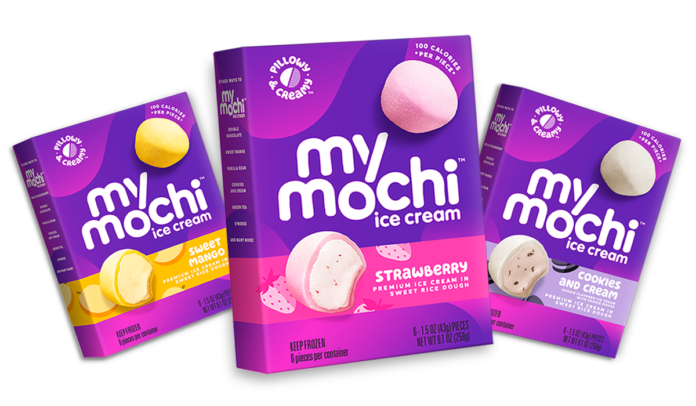“We launched My/Mo Mochi Ice Cream in 2017 … but many consumers kept calling us My/Mochi,” said Chief Marketing Officer Russell Barnett. “So rather than trying to correct them, we just leaned into exactly what consumers were calling us.”
In addition to the product name change that took effect last week, the Vernon-based company also focused on packaging. The new design features purple as the “unifying brand color” while previous packaging hues closely resembled the flavor of the ice cream in each box.
The new two-tone coloring also stands for “duality of texture between the chewy dough and creamy ice cream,” according to Barnett.
Bulletproof, a New York-based strategic brand and packaging design agency, developed the new look.
“We spent a lot of time talking with our consumers … to make sure that we really delivered what they were looking for from our brand,” he said. “As a market leader, we have 80% of the mochi ice cream category, and we want to be sure that what we’re doing is maintaining that brand and that awareness, everything that people have come to know and love about our brand and just making it more right for them.”
The history of Mochi Ice Cream Co. dates to 1910, when Japanese pastry shop Mikawaya opened in Little Tokyo. Founder Ryuzaburo Hashimoto sold the store in 1925 to his nephew, Koroku Hashimoto, and Koroku’s wife, Haru. Their daughter, Frances Hashimoto, took the reins in 1970. She and her husband, Joel Friedman, are credited with inventing the popular dessert, a ball of ice cream wrapped in mochi rice cake.
When El Segundo-based Century Park Capital Partners bought the business in 2015, the company’s mochi product was sold in “fewer than 1,000 niche ethnic and specialty grocery stores,” according to the company.
The private equity firm rebranded the business as Mochi Ice Cream Co. and expanded distribution “to more than 20,000 grocery, club and foodservice locations nationwide.”
The company traded hands again last year when Michigan-based Lakeview Capital Inc. acquired it on undisclosed terms. It has since grown to more than $175 million in annual retail sales, and its products are available at major grocery chains, including Vons, Walmart, Kroger and Target.
Last July My/Mochi products debuted in some 6,000 7-Eleven locations. Its factory in Vernon employs about 250 workers who churn out about a dozen core flavors, including strawberry, mango, green tea and double chocolate, and holiday favorites such as apple pie a la mode and cool peppermint.
“We’re vertically integrated, so we make the mochi dough and we make the mochi ice cream,” Barnett said.
Pandemic-induced runs on groceries helped beef up the company’s bottom line but also prompted changes in product offering — it discontinued providing loose, unpackaged ice cream balls from self-serve freezers at grocery stores in May and replaced them with single-serve packs.
“I think like everybody in the frozen space, our sales continue to be very solid,” Barnett said. “Freezer stocking continues to be something that almost everybody in our space is benefiting from."

